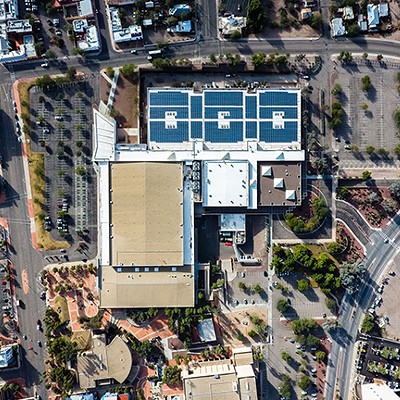Before Ed Moore, a populist who went into office a Democrat and left as a Republican/independent, delivered his motion to levy the impact fees he announced his support for a half-cent sales tax to pay for new roads. The cut-rate impact fee also appealed to Republicans Mike Boyd and Paul Marsh and the measure passed over dissents from Raúl Grijalva and fellow Democrat Dan Eckstrom, who sported a SAHBA button and whose only word throughout the long meeting was his "no" vote.
Designated hitters from the Growth Lobby cried that the sky would fall. Ted Bednar, owner of TJ Bednar Homes, decried the anti-business bent of the county. He said previous actions by supervisors forced him to work double to keep his company afloat. The impact fee, he declared, would essentially ruin him by rendering him unable to compete with national builders. Now, Bednar's company is the Southern Arizona Home Builders Association Builder of the Year. The honor is heralded on huge billboards that assert that Bednar has been "perfecting the past for 26 years."
Homebuilders won that battle. Republican supervisors chopped the impact fee sought by County Administrator Chuck Huckelberry by more than half. They built in appeals, to allow for hardship and affordable housing exemptions. They exempted huge chunks of the county, Avra and Altar valleys in the west, and the area between the Rincon Valley and Sahuarita. Moreover, impact fee revenues were confined to accounts only to supplement road improvement expenses within the respective areas. Left out were parks, schools, courts and cops.
The sales tax proposal from Moore, who had cast himself as an anti-tax conservative, was startling. Voters had twice rejected a half-cent sales tax for roads in 1986 and 1990 by huge margins and also rejected a quarter-cent sales tax for jails and juvenile detention in 1994. All that was necessary for Moore's plan was a unanimous vote by the Board of Supervisors. But Marsh vetoed it, as has Ray Carroll, a Republican who represents the same eastside and Green Valley district Marsh served.
Today's impact fees, Huckelberry says, are "based on antiquated law."
Revisions are based on the four-year-old Arizona Growing Smarter law and will spread impact fees for houses and commercial construction in all areas. Of the 11,300 construction permits issued in each of the last six years in unincorporated Pima County, 9,200 were residential and 1,600, or 14 percent, were commercial.
Pima County, Huckelberry says, "is left with the financial responsibility to subsidize new roadway infrastructure needed to accommodate new commercial development."
Nearly 74 new homes, generating 10 car trips a day, are necessary to match the traffic of the average Circle K. A typical fast-food outlet with a drive-through generates 496 trips a day--nearly 5 times the amount as a single-family house, according to the Institute of Transportation Engineers.
Exemptions in rural areas, typically dotted with the wildcat subdivisions the Board of Supervisors claims to deplore, will be closed. In the report that supervisors will use November 12 to initiate increased impact fees, Huckelberry notes that the county lost out on more than $3.8 million for the Altar Valley, Avra Valley and Mountain View areas. Supervisors granted another $2 million in fee reductions and waivers.
Much more alarming is the picture Huckelberry is presenting for justification. The road improvement plan contains 67 projects with a $955 million price tag. Twenty-five of those projects are either extensions of or the same projects included in the 57 road improvements in the $350-million bond plan that voters approved five years ago. Bonds in that program, which has been delayed, mismanaged and tainted by widespread political favoritism, are being repaid by the county's share of state gas taxes.
Costs have soared from the $186 million plan advanced in 1996 because of the county's low-ball projections, a new wish list and inflation. Within the transportation plan that Huckelberry wants to use impact fees for are 48 new projects costing $716.4 million. Costs also have jumped on the projects that were drawn six years ago. For example, Cortaro Farms Road, from I-10 to Thornydale Road on the congested northwest side, was priced at $10.5 million in 1996 and now is estimated to cost nearly $22 million.
Some projects have far outpaced the cost that voters were told when they supported the road bonds in November 1997. Voters, for example, supported $13.5 million in bonds for 2.5 miles of widening of River Road from Campbell Avenue to Alvernon. The cost now is pegged at $22 million.
Pima County is not without road money. For 20 years ending in 2016, the county will receive $1.1 billion in gas taxes. Still, Huckelberry is playing to a receptive audience. Carroll has been pushing for several years to jack up impact fees.
Alan Lurie, the retired Air Force general who is executive vice president of the Southern Arizona Home Builders Association, is prepping members for the fight.
Studies by Texas A&M and the University of Arizona of five Tucson subdivisions "concluded that growth pay its way. I don't believe this in universally true, but give the industry credit when due," Lurie says.
Lurie, in his association publications, is taking aim at Supervisor Richard Elias, the freshman Democrat who is pushing for affordable housing. Elias has bemoaned the 6 percent annual increase in local housing prices while workers get "roughly 3 percent" a year in pay increases.
Elias, Lurie says, "cannot connect the dots. Elias and the supervisors want to double impact fees to $3,100. That's a 3.1 percent tax on a $100,000 home. How do 3 percent salary increases cover that?"
Supervisors on Tuesday will set a timeline that includes a public hearing March 18. The $3,500 fee would become effective July 7.












